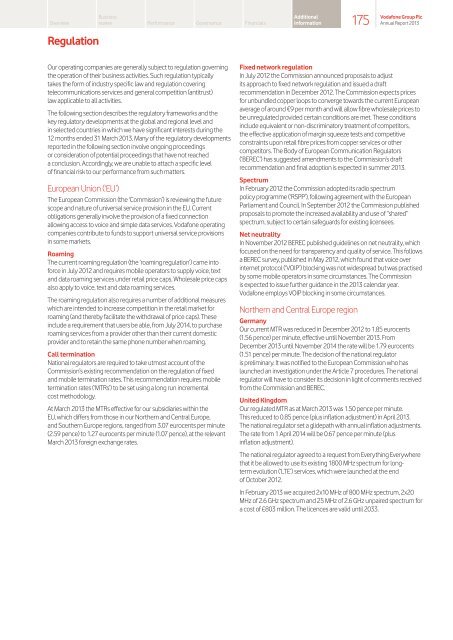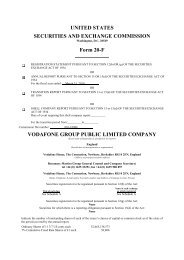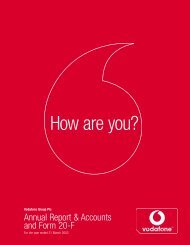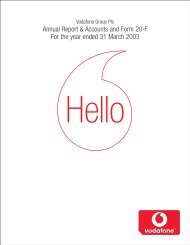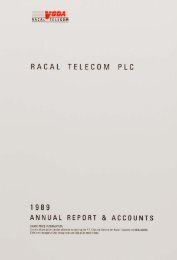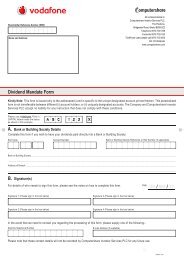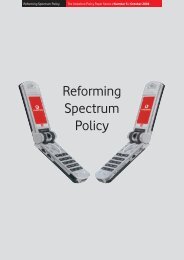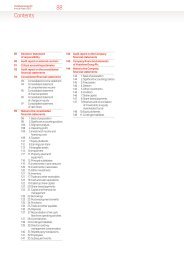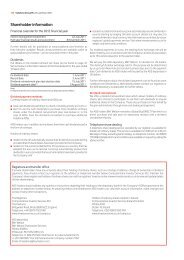The way ahead? - Vodafone
The way ahead? - Vodafone
The way ahead? - Vodafone
You also want an ePaper? Increase the reach of your titles
YUMPU automatically turns print PDFs into web optimized ePapers that Google loves.
Overview<br />
Regulation<br />
Business<br />
review Performance Governance Financials<br />
Our operating companies are generally subject to regulation governing<br />
the operation of their business activities. Such regulation typically<br />
takes the form of industry specific law and regulation covering<br />
telecommunications services and general competition (antitrust)<br />
law applicable to all activities.<br />
<strong>The</strong> following section describes the regulatory frameworks and the<br />
key regulatory developments at the global and regional level and<br />
in selected countries in which we have significant interests during the<br />
12 months ended 31 March 2013. Many of the regulatory developments<br />
reported in the following section involve ongoing proceedings<br />
or consideration of potential proceedings that have not reached<br />
a conclusion. Accordingly, we are unable to attach a specific level<br />
of financial risk to our performance from such matters.<br />
European Union (‘EU’)<br />
<strong>The</strong> European Commission (the ‘Commission’) is reviewing the future<br />
scope and nature of universal service provision in the EU. Current<br />
obligations generally involve the provision of a fixed connection<br />
allowing access to voice and simple data services. <strong>Vodafone</strong> operating<br />
companies contribute to funds to support universal service provisions<br />
in some markets.<br />
Roaming<br />
<strong>The</strong> current roaming regulation (the ‘roaming regulation’) came into<br />
force in July 2012 and requires mobile operators to supply voice, text<br />
and data roaming services under retail price caps. Wholesale price caps<br />
also apply to voice, text and data roaming services.<br />
<strong>The</strong> roaming regulation also requires a number of additional measures<br />
which are intended to increase competition in the retail market for<br />
roaming (and thereby facilitate the withdrawal of price caps). <strong>The</strong>se<br />
include a requirement that users be able, from July 2014, to purchase<br />
roaming services from a provider other than their current domestic<br />
provider and to retain the same phone number when roaming.<br />
Call termination<br />
National regulators are required to take utmost account of the<br />
Commission’s existing recommendation on the regulation of fixed<br />
and mobile termination rates. This recommendation requires mobile<br />
termination rates (‘MTRs’) to be set using a long run incremental<br />
cost methodology.<br />
At March 2013 the MTRs effective for our subsidiaries within the<br />
EU, which differs from those in our Northern and Central Europe,<br />
and Southern Europe regions, ranged from 3.07 eurocents per minute<br />
(2.59 pence) to 1.27 eurocents per minute (1.07 pence), at the relevant<br />
March 2013 foreign exchange rates.<br />
Additional<br />
information<br />
175<br />
<strong>Vodafone</strong> Group Plc<br />
Annual Report 2013<br />
Fixed network regulation<br />
In July 2012 the Commission announced proposals to adjust<br />
its approach to fixed network regulation and issued a draft<br />
recommendation in December 2012. <strong>The</strong> Commission expects prices<br />
for unbundled copper loops to converge towards the current European<br />
average of around €9 per month and will allow fibre wholesale prices to<br />
be unregulated provided certain conditions are met. <strong>The</strong>se conditions<br />
include equivalent or non-discriminatory treatment of competitors,<br />
the effective application of margin squeeze tests and competitive<br />
constraints upon retail fibre prices from copper services or other<br />
competitors. <strong>The</strong> Body of European Communication Regulators<br />
(‘BEREC’) has suggested amendments to the Commission’s draft<br />
recommendation and final adoption is expected in summer 2013.<br />
Spectrum<br />
In February 2012 the Commission adopted its radio spectrum<br />
policy programme (‘RSPP’), following agreement with the European<br />
Parliament and Council. In September 2012 the Commission published<br />
proposals to promote the increased availability and use of “shared”<br />
spectrum, subject to certain safeguards for existing licensees.<br />
Net neutrality<br />
In November 2012 BEREC published guidelines on net neutrality, which<br />
focused on the need for transparency and quality of service. This follows<br />
a BEREC survey, published in May 2012, which found that voice over<br />
internet protocol (‘VOIP’) blocking was not widespread but was practised<br />
by some mobile operators in some circumstances. <strong>The</strong> Commission<br />
is expected to issue further guidance in the 2013 calendar year.<br />
<strong>Vodafone</strong> employs VOIP blocking in some circumstances.<br />
Northern and Central Europe region<br />
Germany<br />
Our current MTR was reduced in December 2012 to 1.85 eurocents<br />
(1.56 pence) per minute, effective until November 2013. From<br />
December 2013 until November 2014 the rate will be 1.79 eurocents<br />
(1.51 pence) per minute. <strong>The</strong> decision of the national regulator<br />
is preliminary. It was notified to the European Commission who has<br />
launched an investigation under the Article 7 procedures. <strong>The</strong> national<br />
regulator will have to consider its decision in light of comments received<br />
from the Commission and BEREC.<br />
United Kingdom<br />
Our regulated MTR as at March 2013 was 1.50 pence per minute.<br />
This reduced to 0.85 pence (plus inflation adjustment) in April 2013.<br />
<strong>The</strong> national regulator set a glidepath with annual inflation adjustments.<br />
<strong>The</strong> rate from 1 April 2014 will be 0.67 pence per minute (plus<br />
inflation adjustment).<br />
<strong>The</strong> national regulator agreed to a request from Everything Everywhere<br />
that it be allowed to use its existing 1800 MHz spectrum for longterm<br />
evolution (‘LTE’) services, which were launched at the end<br />
of October 2012.<br />
In February 2013 we acquired 2x10 MHz of 800 MHz spectrum, 2x20<br />
MHz of 2.6 GHz spectrum and 25 MHz of 2.6 GHz unpaired spectrum for<br />
a cost of £803 million. <strong>The</strong> licences are valid until 2033.


